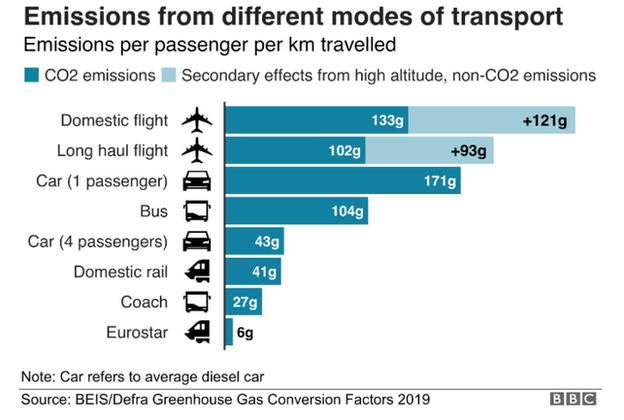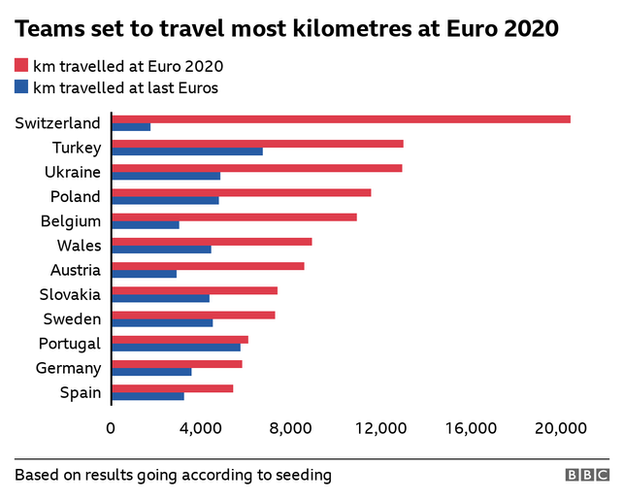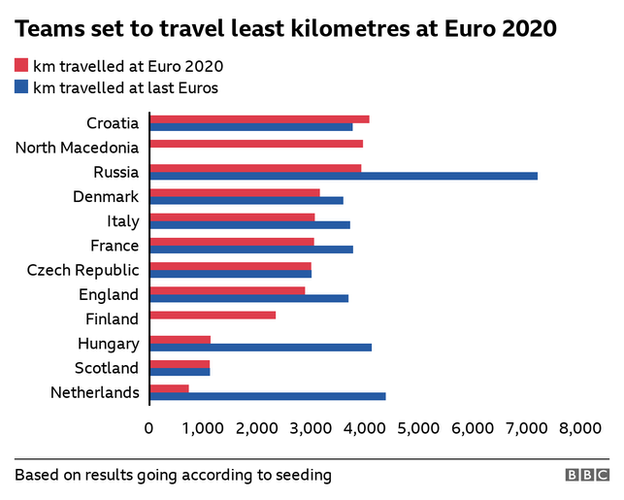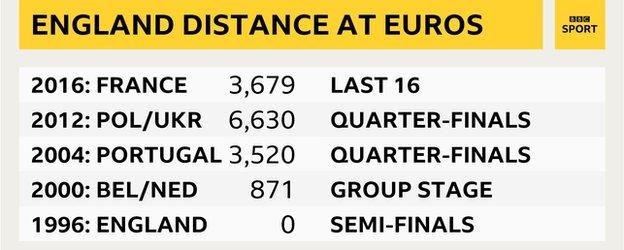Euro 2020: What is the climate cost of tournament staged in 11 countries?
- Published

Uefa Euro 2020 on the BBC |
|---|
Dates: 11 June-11 July. Venues: Amsterdam, Baku, Bucharest, Budapest, Copenhagen, Glasgow, London, Munich, Rome, Seville, St Petersburg. Coverage: Live on BBC TV, BBC Radio 5 Live, iPlayer and the BBC Sport website and app. Click here for more details |
Uefa Euro 2020 promises to be a tournament like no other, staged across more countries than any international football event in history.
And while coronavirus has dominated the build-up - the original list of 12 host nations was reduced to 11 as recently as April and capacities at stadiums will be limited - it is far from the only major global issue causing concern at this European Championship.
At a time when the world is attempting to tackle the threat of "irreversible" climate change, is it really sensible that players, officials and fans will be criss-crossing the continent like never before?
What are the main climate concerns around Euro 2020?
From Seville in the west of the continent to Baku 4,766km away in the east, significant amounts of air travel will be involved at Euro 2020 - both for players and the thousands of fans wanting to watch their team. Covid restrictions mean the volume of air traffic will be far lower than one initial estimate of an extra two million plane trips, external during the tournament, but it will still be significant.
Climate experts and campaigners say we need to avoid or reduce flying because greenhouse gases, produced when fuel is burned, are "the root cause", external of global warming. Scientists have warned that such warming could have a catastrophic effect on the planet.
Aviation actually only contributes about 3.5% of the world's global carbon emissions, according to Carbon Brief,, external but only a very small percentage of the world flies frequently, meaning those who do are disproportionately responsible for these emissions.
For example, a return flight from London to New York gives out about 11% of the average annual carbon emissions for someone in the UK - or about the same as those produced by someone living in Ghana over a year. It would also use nearly a third of the current suggested per person carbon budget, external for an entire year.

Huge distances, high emissions
Previous European Championships have been staged either in one country or shared between two hosts, meaning long-distance travel - and therefore carbon dioxide (CO2) emissions - has been limited. It has also necessitated less of a reliance on flying, with trains and other forms of transport viable alternatives.
But that will rarely be the case at Euro 2020.
If the tournament goes according to seedings, a Switzerland fan following their team would have to travel 20,377km (12,662 miles), further than supporters of any other country. It would involve three separate trips to Baku, with matches in Rome and Amsterdam in between. That total distance is around the equivalent of flying from London to New York and back - twice. Their total would rise to 21,656km if they were to reach the final.
Even if the Swiss went out in the group stage, a fan travelling to watch each of their matches would clock up 13,115km - almost twice as many kilometres as in all their previous European Championship appearances combined (6,750km across 1996, 2004, 2008, 2016).
They are not alone. Of the 22 teams to have been in a European Championship before, 13 are set to travel more kilometres in this tournament than in their most recent Euros, despite many being host nations.

Only England, Russia, Italy, Denmark, Hungary and the Netherlands - who are all hosting group games - plus France (who travelled up and down their own country at their home event in 2016) travelled more kilometres at their previous Euros than they are predicted to do this time. Scotland, a host, and the Czech Republic are set to travel almost exactly the same distance as at their last Euros.
Most of the host countries who have qualified are at the lower end for potential distance travelled. Seven of the 10 teams set to travel the shortest distance are hosts.

To put these distances into a climate context, a Swiss quarter-final exit (if results go according to seedings) would give each of those fans flying to games an estimated footprint of 3,973kg of CO2 (almost four tonnes). That is about the world average per person for all activities for an entire year (4,000kg), although it is higher in the Western world. The UK average is 10,000kg.
Of the British teams involved, Wales fans face the biggest journeys. Like Switzerland, they have games in Baku and Rome and if they go out in the group stage - as their seeding would suggest they might - those trips would see their fans rack up 8,892km. If they were to finish as group runners-up and then make it to the quarter-finals, another trip to Baku would await, taking that tally to 16,410km.
How far Wales could travel at Euro 2020 (in kms) | |||
|---|---|---|---|
Position | Last 16 | Quarter-finals | Semi-finals/final |
Win group | 8,940 | 10,772 | 10,781 |
Second in group | 9,155 | 16,410 | 16,410 |
Third in group (with last 16 in Seville) | 10,534 | 11,930 | 11,939 |
Third in group (with last 16 in Bucharest) | 10,731 | 12,447 | 12,489 |
Third in group (with last 16 in Glasgow) | 9,755 | 12,827 | 12,876 |
If Wales go out in the group stages, they will travel 8,892km | |||
The Netherlands will only travel 720km according to our criteria (more on how we worked this out at the bottom of this article) - playing three group games in Amsterdam and then a last-16 tie in London.
Even if they go all the way and win the tournament, they would only travel 2,560km if they finish second in Group C. Winning their group would add a lot of miles because it would mean a quarter-final trip to Baku.
England will have to travel 2,874km at most if they win their group - even if they win the tournament (just one return trip from London to Rome).
How far England could travel at Euro 2020 (in kms) | ||
|---|---|---|
Position | Last 16 | Quarters/semi/final |
Win group | 0 | 2,874 |
Second in group | 1,916 | 4,208 |
Third in group (with last 16 in Seville) | 3,269 | 4,413 |
Third in group (with last 16 in Glasgow) | 1,108 | 3,959 |
Third in group (with last 16 in Budapest) | 2,903 | 8,003 |
If England go out in the group stages, they will travel 0km as all their games are in London | ||
That would actually mean less travelling for the Three Lions than in their past three European Championships.

The distance an England fan would have travelled in kilometres to watch them in each Euros
Scotland's group games all take place in Glasgow or London - meaning they may only need to travel 1,108km by land if they go out in the group stages.
Glasgow and London are two of their five last-16 venue possibilities too.
How far Scotland could travel at Euro 2020 (in kms) | |||
|---|---|---|---|
Position | Last 16 | Quarter-finals | Semi-finals/final |
Win group | 2,216 | 5,067 | 5,090 |
Second in group | 3,207 | 5,373 | 5,962 |
Third in group (with last 16 in Seville) | 5,225 | 6,402 | 6,500 |
Third in group (with last 16 in Glasgow) | 1,108 | 5,044 | 5,067 |
Third in group (with last 16 in Budapest) | 4,792 | 9,765 | 10,056 |
If Scotland go out in the group stages, they will travel 1,108km | |||
The decision to move Dublin's group games to St Petersburg and Bilbao's matches to Seville - both in Group E - have potentially added 3,982km to Poland's travels, 2,840 to Slovakia's and 2,191 for Sweden.
Poland are set to face three different trips to Russia, with games in Seville and Copenhagen in between.
Dublin's last-16 tie moving to London is likely to save air miles for two teams. Dublin was the most westerly city scheduled to host a game.
What is Uefa doing to reduce the impact of Euro 2020?
Uefa says it is "committed to ensuring the sustainability" of the Euros and has already offset the carbon flight emissions of all spectators, teams and Uefa officials travelling to and from matches via "gold standard" programmes. It has done this based on full capacity in stadiums.
It also points to the fact that only one new stadium - in Budapest, Hungary - has been built for this competition. By contrast, four out of 10 host stadiums were newly constructed for Euro 2016 in France.
"The nature of the tournament means there are many benefits over a traditional one," said Uefa president Aleksander Ceferin, speaking in 2019.
"In addition to being able to take the matches to more diverse communities across Europe, there is no need either to build a host of new stadiums or the transport links that they require, which carry a huge environmental impact from, for instance, materials and other resources used for the development of such infrastructure."
Uefa, a signatory of the United Nations Sports for Climate Action Framework,, external also says free public transport will be available for ticket holders on match days.
It adds that minimising waste in stadiums "as much as possible" is one of their goals and the amount of waste re-used will be reviewed by Uefa.
What do climate experts say?
But climate campaigners say such mitigation is not enough and far more radical change is needed.
"Uefa has gone down the offsetting route before and that is massively problematic and lacks scientific credibility," said Andrew Simms, Rapid Transition Alliance co-ordinator and co-director of New Weather Institute.
"There are arguments which suggest that thinking you can offset prevents other change and makes business as usual even more likely.
"That means you have to think about the design of competitions and you have to think of minimising impact as a key design criteria of how you run things. So coming up with a competition across 11 countries is the very opposite of that.
"It's almost like going out and saying: How can we design a competition to maximise our environmental impact?
"We are already heading beyond the climate red lines and anything more we do is going to accelerate the speed at which we cross them.
"A competition like this is clearly not compatible with staying the right side of those red lines, but almost worse than that direct carbon impact is the way it sends a message that it is not a problem that is sufficiently important for the sport to deal with when we know it's fundamentally important that society addresses it.
"It implies the laws of physics don't apply to Uefa and that is a very bad signal to send. It is toxic, damaging and dangerous.
"It's not until you get bodies like Uefa standing up and accepting that they are fundamentally part of the problem that meaningful change will happen."
How we calculated the distances
We based out data calculations on the tournament going according to Uefa's seedings. So figures are worked out on each group finishing with the top seeds in first place, the second seeds in second place, and so on. The four third-placed teams with the most points go into the last 16 so we eliminated the two lowest-seeded sides. From that point on, we worked out that the higher seeded team would win each knockout tie.
That had Belgium beating England in the final, Ukraine and Germany losing in the semis, and Switzerland, Poland, Spain and Italy going out in the quarter-finals. Turkey, Austria, Portugal, Croatia, France, Russia, Denmark and the Netherlands all went out in the last 16.
We calculated a fan starting and finishing in the capital city of their country - or their host city in the cases of Spain, Russia, Scotland and Germany. They flew directly from game to game without going home in between.
It does not factor in the fact many routes do not have direct flights - so, for instances, Switzerland's CO2 emissions are actually likely to be higher than estimated because there are so few direct flights to Baku, meaning multiple flights, and therefore extra emissions, will be required.
Also it does not factor in that some journeys to neighbouring countries - such as Glasgow to London - may be done by land instead of air.

